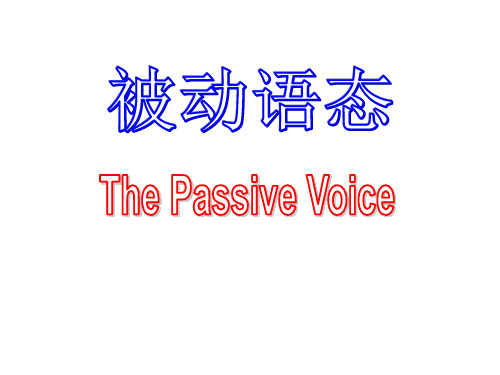初中英语被动语态公开课课件
合集下载
初中被动语态ppt课件完整版

错误示例
He has finished his homework yesterday.
2024/1/26
错误分析
助动词“has”与过去时间状语 “yesterday”不符,应使用一
般过去时的被动语态“was finished”。
纠正方法
注意助动词与谓语动词的搭配, 以及助动词与主语在数和时态上 的一致性。同时,根据句子意思
05
改写句:The classroom was
cleaned by somebody yesterday.
06
31
06
总结回顾与拓展延伸
2024/1/26
32
关键知识点总结回顾
被动语态的基本构成
be动词+动词的过去分词
被动语态的时态变化
根据句子中的时间状语或上下文判断 时态,选择相应的be动词形式
选择题专项训练
答案
C
解析
根据last year可知句子为一般过去时,主语The book与谓语动词write为被动关系,故用一般过去时 的被动语态was written,故选C。
2024/1/26
23
选择题专项训练
选择题二
题目:The flowers _______ often.
2024/1/26
初中被动语态ppt课件完整 版Biblioteka 2024/1/261
目录
2024/1/26
• 被动语态基本概念与构成 • 被动语态时态变化规则 • 特殊类型句子中被动语态应用 • 典型错误分析与纠正方法 • 练习题精选与详解 • 总结回顾与拓展延伸
2
01
被动语态基本概念与 构成
2024/1/26
3
被动语态公开课课件

过去被动语态
was/were + 过去分词(例如:The movie was directed by the famous director.)
02
被动语态的用法
用于强调动作的承受者
总结词
在某些语境中,我们使用被动语态来强调动作的承受者,而不是动作的执行者。
详细描述
被动语态可以使句子更加聚焦于动作的承受者,突出其重要性和关注点。例如, “The book was written by the author”这句话中,重点是书本身,而不是写 书的作者。
03
被动语态的构成
现在时被动语态
现在时被动语态的构 成:be + 过去分词
现在时被动语态的时 态变化:根据主语的 人称和数进行变化
现在时被动语态的用 法:表示当前正在进 行的动作或存在的状 态
过去时被动语态
过去时被动语态的构成: was/were + 过去分词
过去时被动语态的用法:表示 过去某个时间发生的动作或存 在的状态
选择题2
The book _____ by me in 2018.
选择题3
The book _____ in 2018.
选择题4
The book _____ by me.
改错题练习
改错题1
The book has been written by me. (改为被动语态)
改错题2
The book was written by me. (改为被动语态)
翻译练习4
这本书已经被印刷了三次。 (被动语 态)
THANKS
感谢观看
详细描述
在英语中,当我们要表达某件事情是可以被完成时,也可以使用被动语态。例如,“The work can be done by him.”这句话表示这项工作可以由他来完成。
九年级英语被动语态公开课获奖课件百校联赛一等奖课件

3. –How is Lin Tao’s weekend? - Not so good. He ____ his homework every weekend. A. makes to do B. is made to do C. is made do D. makes do
4. –Mary was heard ____ just now. What happened? - John was telling a joke. A. cry B. to cry C. laugh D. to laugh
My bike was stolen.
我旳自行车被盗了。
3、某些句子习惯上用被动语态。 例如: He was born in October,1989. 4、汉语中具有“被”、“由”等 词时。例如:
Tina是被Paul叫来旳。 Tina is asked to come by Paul.
5、汉语中具有“据说”、“据悉”、 “据报道”等时。例如: “据说” It is said that … “据报道” It is reported that … “众所周知” It is well- known that … “人们以为” It is supposed that …
常见旳主语是人,但谓语用被动旳句型
• 1. 某人被邀请做某事Sb. be invited to do sth • 2. 某人被允许做某事 Sb be allowed to do sth • 3. 某人被要求去做某事 Sb be asked to do sth • 4. 某人被告知要做某事Sb told to do sth • 5. 某人被送到某地 Sb be sent to + 地名 • 6.某人被邀请到某地Sb be invited to + 地名 • 7. 某人被带去到某地Sb be taken to + 地
4. –Mary was heard ____ just now. What happened? - John was telling a joke. A. cry B. to cry C. laugh D. to laugh
My bike was stolen.
我旳自行车被盗了。
3、某些句子习惯上用被动语态。 例如: He was born in October,1989. 4、汉语中具有“被”、“由”等 词时。例如:
Tina是被Paul叫来旳。 Tina is asked to come by Paul.
5、汉语中具有“据说”、“据悉”、 “据报道”等时。例如: “据说” It is said that … “据报道” It is reported that … “众所周知” It is well- known that … “人们以为” It is supposed that …
常见旳主语是人,但谓语用被动旳句型
• 1. 某人被邀请做某事Sb. be invited to do sth • 2. 某人被允许做某事 Sb be allowed to do sth • 3. 某人被要求去做某事 Sb be asked to do sth • 4. 某人被告知要做某事Sb told to do sth • 5. 某人被送到某地 Sb be sent to + 地名 • 6.某人被邀请到某地Sb be invited to + 地名 • 7. 某人被带去到某地Sb be taken to + 地
被动语态公开课PPT课件

名词的变化
动词变名词
形容词变名词
名词加-y变名词
动词加-er变名词
代词的变化
变化规则:根据句子主语的 变化而变化
代词:被动语态中的主语代 词变化
代词的变化形式:根据不同 的时态和语态而变化
代词的变化意义:表示动作 的执行者或接受者
冠词的变化
用于单数名词前,表示类别
用于复数名词前,表示多数
用于不可数名词前,表示数量
科技文献中的应用
描述科学实验结果
撰写科技论文
编写专利申请书
描述工程设计中的细节
商业文书中的应用
商业计划书 年度报告 合同协议 产品说明书
日常生活中的运用
新闻报道:新闻报道中经常使用被动语态来客观地描述事件 科技文献:科技文献中被动语态的运用可以让读者更加专注于研究本身 商业报告:商业报告中被动语态的运用可以让报告更加客观、可信 法律文书:法律文书中被动语态的运用可以让法律条文更加清晰、简洁
been done
被动语态完成 进行时: have/has
been being done
被动语态的句型应用
基本句型结构
被动语态的时态
添加标题
添加标题
特殊句型结构
添加标题
添加标题
被动语态的否定和疑问句型
PART 4
被动语态的词汇变化
动词的变化
过去分词形式变 化
助动词be的变化
动词的时态变化
动词的语态变化
YOU,a click to unlimited possibilities
汇报人:
时间:20XX-XX-XX
目录
01
02
03
04
05
06
初中英语被动语态公开课课件

肯定句 主语+am/is/are+过去分词+(by-)
主 语 +am/is/are not+ 过 去 分 词 +(by-) 一般疑问 Am/Is/Are+主语+过去分词+(by)? 句 特殊疑问 特殊疑问词+am/is/are+主语+过 句 去分词+(by-)?
否定句
C to be the 1,The Chinese food _____ healthiest in the world. A. considers B. is considering C. is considered D. has considered 2,这首歌被许多年轻人所喜爱。 This song is loved by many young people.
6、plant planted-planted
asked-asked 7、produce produced-produced 8、ask
9、plan planned-planned 10、send sent-sent
11 、 build built-built 12、invite invited-invited
有各种时态的变化
主语+am/is/are+动词过去分词(by+动词执行者)
主语+was/were+动词过去分词(by+动作执行者)ຫໍສະໝຸດ 一般过去时被动语态肯定句结构
否定句: 在be 动词was/were后加not 一般疑问句: 将be动词was/were提到句首 特殊疑问句: 特殊疑问词+一般疑问句
[2]. The lost boy ____ at the street corner last night. A. was found B. is found C. was looked for
主 语 +am/is/are not+ 过 去 分 词 +(by-) 一般疑问 Am/Is/Are+主语+过去分词+(by)? 句 特殊疑问 特殊疑问词+am/is/are+主语+过 句 去分词+(by-)?
否定句
C to be the 1,The Chinese food _____ healthiest in the world. A. considers B. is considering C. is considered D. has considered 2,这首歌被许多年轻人所喜爱。 This song is loved by many young people.
6、plant planted-planted
asked-asked 7、produce produced-produced 8、ask
9、plan planned-planned 10、send sent-sent
11 、 build built-built 12、invite invited-invited
有各种时态的变化
主语+am/is/are+动词过去分词(by+动词执行者)
主语+was/were+动词过去分词(by+动作执行者)ຫໍສະໝຸດ 一般过去时被动语态肯定句结构
否定句: 在be 动词was/were后加not 一般疑问句: 将be动词was/were提到句首 特殊疑问句: 特殊疑问词+一般疑问句
[2]. The lost boy ____ at the street corner last night. A. was found B. is found C. was looked for
初中英语被动语态公开课ppt

用于句子的主语是动作的执行者时
定义:当动作的 执行者不是句子 的主语时,需要 使用被动语态。
语法:be动词+ 动词的过去分词。
例子:The book was written by him.(这本书 是由他写的。)
注意:在被动语 态中,动作的执 行者可以用by 引出。
用于there be句型中
含义:表示“某地有某物” 结构:there be+主语+其他成分 动词特点:动词必须是be动词,且后面接形容词或名词 用法:表示存在关系,主语是存在的物体或情况
04
被动语态的用法
用于句子的主语是动作的承受者时
定义:当动作的承受者位于句子的主语位置时,使用被动语态。
语法形式:be动词+动词的过去分词
例子:The book was written by him.(书是由他写的) 解释:在这个句子中,“the book”是动作的承受者,因此使用被动语态 “was written”,表示“被写”。
用于it作主语的句子中
形式主语:it
真正主语:不定式短语、that引 导的名词性从句等
添加标题
添加标题
谓语动词:be+过去分词
添加标题
添加标题
常见句型:It is+过去分词+that 从句;It is+形容词+to do;It is+形容词+that从句等。
被动语态的特殊用
05
法
主动形式表示被动意义
参考答案:详见PPT
练习题内容:现在时被动语 态的用法
练习题形式:单选、填空、 改错等
练习题二:过去时被动语态的用法
练习题一:现在进行时被动语态的用法 练习题三:将来时被动语态的用法 练习题四:过去完成时被动语态的用法 练习题五:现在完成时被动语态的用法
初中被动语态优秀课件

一.生活中不是每个句子都需要用被动语态表示。像“Basketball was played by him ”虽然语法是对的,但意思很别扭。所以生活中用主动句 用的还是多一些。 什么时候用被动句呢?
* 一般是没必要说出施动者,或不知道施动者是谁,或为了强调受动者, 才采用被动语态。
如. 他的钱包被偷了; 我的作业完成了;水卖完了,杭州出产茶叶; 英语在全世界广泛使用等 。
注意:be used to doing 某人习惯于做...( 主语和后的动词是主动关系
be used to do 主语被用来做...(主语和use 是被动关系)
被动语态的特殊用法:
1.感官动词see,watch,hear,notice,feel, listen to, look at和使役动词make, let, have等作宾语补语的都是原型; 但改成被动语态后必须带to。 e.g. make sb. do(原型) sth. 使某人做某事
2. His plan __D___ good.
A. has sounded B. is sounding
C. is sounded D. sounds
Quiz 2
•The
shop
__A___
Quiz 2
at 6 am. every
day.
A. opens
B. opened
C. is opened
Your clothes should be washed. 你的衣服该洗了。
(以上句子中都省略了by+ 施动者)
**可见,被动句的各种时态只变be动词的时态就行,过去分词始 终不变。
表格:被动态am基/is本/ar结e do构ne
was/were done am/is/are being done was/were being done (shall/will/be going to) be done
被动语态讲解公开课PPT课件

初中被动语态的奥秘
中考必考的重点语法
第1页/共41页
语态
语态:表示主语和谓语动词之间的关系。 英语有两种语态,即主动语态和被动语态。
主动语态:表示主语是动作的执行者。被动语态:表示主语是动作的承受者。 如: Many students study English.(主动语态) English is studied by many students.
• Children will take some photos in the schoolyard tomorrow.
Some photos will be taken by children in the school tomorrow.
• The headmaster will give a talk this afternoon.
was given by
第24页/共41页
3. A lot of people in China can speak English now . (同上) English ______ ____ ______ by a lot of people in China now.
4. I have learned English for about two years. (同上) English ______ ___c_a_n_ _b_e____spfoorkaebnout two years.
The teacher often asks him questions.
He
is asked
questions
by the teacher.
1.把主动语态的宾语变为被动语态的主语。
2.把主动语态的谓语变为被动语态的谓语。 3.把主动语态的主语变为被动语态的by
中考必考的重点语法
第1页/共41页
语态
语态:表示主语和谓语动词之间的关系。 英语有两种语态,即主动语态和被动语态。
主动语态:表示主语是动作的执行者。被动语态:表示主语是动作的承受者。 如: Many students study English.(主动语态) English is studied by many students.
• Children will take some photos in the schoolyard tomorrow.
Some photos will be taken by children in the school tomorrow.
• The headmaster will give a talk this afternoon.
was given by
第24页/共41页
3. A lot of people in China can speak English now . (同上) English ______ ____ ______ by a lot of people in China now.
4. I have learned English for about two years. (同上) English ______ ___c_a_n_ _b_e____spfoorkaebnout two years.
The teacher often asks him questions.
He
is asked
questions
by the teacher.
1.把主动语态的宾语变为被动语态的主语。
2.把主动语态的谓语变为被动语态的谓语。 3.把主动语态的主语变为被动语态的by
- 1、下载文档前请自行甄别文档内容的完整性,平台不提供额外的编辑、内容补充、找答案等附加服务。
- 2、"仅部分预览"的文档,不可在线预览部分如存在完整性等问题,可反馈申请退款(可完整预览的文档不适用该条件!)。
- 3、如文档侵犯您的权益,请联系客服反馈,我们会尽快为您处理(人工客服工作时间:9:00-18:30)。
如:The cake tastes delicious.
[7]. Many people ___ during the earthquake in May, 2008.
A. were died B. dead C. died
happen, last, die等动词不使用 被动.
思考2: 判断下列句子的正误
1.It will happen in 50 years. ( √ ) 2.It will be happened in 50 years. ( x )
注意问题2: 不及物动词没有被动语态,如:
happen, take place , begin , become dissappear, come out.
The room_m_u_s_t_n’_ _bt e_ _c_le_a_n_e_d by you today.
2.We should finish our homework on time Our homework_sh_o_u_l_d_b_e_ _f_in_i_sh_e_d by us on time.
A. was found B. is found C. was looked for
一般过去时的被动语态: was / were + PP
把下列句子改为被动语态:
(二) 时态: 一般过去时
结构: was/were + done
1.The man repaired the car yesterday. T_i_r_e_d_ by the man yesterday.
2.Many young people love Jay Chou’ songs.
Jay Chou’s songsa_re___ l_o_v_e_d__ by many young people.
task
[2]. The lost boy ____ at the street corner last night.
task
[5]. Flowers ____ every day. A. has been watered B. should be watered C. should water
含有情态动词的被动语态: 情态动词 + be + PP
(四)含有情态动词的被动语态:
结构:情态动词 + be + done 1.You mustn’t clean the room today.
B. needs repairing
C. needs to repair need, allow 可以用-ing形式表示 被动 need to be done = need doing be allowed to do = allow doing
练习: 将下列句子变为被动句。
1.Li Lei listens to his father carefully.
Part 3
练习: 用be动词的正确形式填空.
1. A knife ____is_____ used to cut apples. 2. The air _h_a_s_b_e_e_n__ polluted already. 3.The rooms __w_i_ll_b_e__cleaned later. 4. The students ___a_r_e__ asked to have breakfast. 5.They should__b_e____ encouraged to study hard. 6.Not only he but also I _w__a_s_ punished last night.
一 用适当的形式填空
1 History is ____m__a_d_e_ by the people. ( make) 2 He is often ___a_s_k_e_d____ to do the work by the teacher. (ask) 3 The book __w_a_s__w_r_it_te_n_ by him last year. ( write ) 4 The radio ___w_a_s_m__e_n_d_e_d__ last week. ( mend)
挑战
[9]. Children should ___. A. take good care of B. be taken good care C. be taken good care of
固定短语的被动不要丢掉后面的 介词或副词
[10]. Your desk ___.
A. needs repair
一般现在时: am/is /are + done 一般过去时: was/were + done 一般将来时: will + be + done
情态动词: 情态动词+be+done 现在完成时: has / have + been + done
Task 4
考点二:
被动语态中的特殊情况:
[6]. ① Good medicine ___ bitter to the mouth.
一般将来时的被动语态: will + be + PP
be going to + be + PP
(三) 时态: 一般将来时
结构:will /be going to + be +done
1.The city will build the new airport next year. The new airport _w_i_ll__ _b_e__ __b_u_i_lt__ next year.
5 Some trees h__a_v_e_b_e_e_n__p_la_n_t_e_d_ on the hill already. (plant) 6 A new subway ___w_i_ll_b__e_b_u_i_lt_ (build) next year. 7 She _h_a_s_b_e_e_n__t_a_k_e_n_ (take) to the hospital already.
The things were taken care of by us.
4.They gave us some work.
We were given some work.
Some work was given to us by them.
5.The boy made them laugh all the time.
already. 10 The trains ____a_re__p_r_o_d_u_c_e_d___( produce) in Zhuzhou.
11 Young trees should ___b_e__w_a_t_e_re_d___(water) often.
Summary 以下时态的被动语态构成
1.Li Ming has already watered some lowers.
Some flowers _h_a_v_e_b_e_e_n_w_a_t_e_r_e_d_by Li Ming already.
2.They have sold out the light green dress The light green dress ____h_a_s__ ___b__e_e_n__ ______s_o_l_d__ out.
主动: see / hear sb. do sth 被动: be seen / heard to do sth
主动: see / hear sb. doing sth. 被动: be seen / heard doing sth.
主动: make sb.do sth. 被动: be made to do sth.
His father is listened to carefully by Li Lei .
2.The mother looked after the baby in the room.
The baby was looked after in the room.
3.We took care of the things.
挑战
[8]. The man ____ clean the toilet because he ___ rubbish when the police walked past the park.
A. was made; was seen to throw B. was made to; was seen throwing C. made; saw
[4]. Three bridges ____ since last year.
A. have built B. were built C. have been built
现在完成时的被动语态: have / has + been + PP
(四) 时态: 现在完成时
结构:Have/has + been +done
2.Mr Song encouraged us to study hard last week. We w__e_re_ __e_n_c_o_u_r_a_g_e_d_ to study hard by Miss Peng last week.
task
[3]. Many houses ____ in the future. A. will build B. will be built C. are built
初三英语
新开一中余艳
Anglebaby
What's her name? She is called Anglebaby.
考点一:
被动语态的基本结构:
be + P.P.
有各种时态的变化
[1]. Now English ____ by more and more people all over the word.
[7]. Many people ___ during the earthquake in May, 2008.
A. were died B. dead C. died
happen, last, die等动词不使用 被动.
思考2: 判断下列句子的正误
1.It will happen in 50 years. ( √ ) 2.It will be happened in 50 years. ( x )
注意问题2: 不及物动词没有被动语态,如:
happen, take place , begin , become dissappear, come out.
The room_m_u_s_t_n’_ _bt e_ _c_le_a_n_e_d by you today.
2.We should finish our homework on time Our homework_sh_o_u_l_d_b_e_ _f_in_i_sh_e_d by us on time.
A. was found B. is found C. was looked for
一般过去时的被动语态: was / were + PP
把下列句子改为被动语态:
(二) 时态: 一般过去时
结构: was/were + done
1.The man repaired the car yesterday. T_i_r_e_d_ by the man yesterday.
2.Many young people love Jay Chou’ songs.
Jay Chou’s songsa_re___ l_o_v_e_d__ by many young people.
task
[2]. The lost boy ____ at the street corner last night.
task
[5]. Flowers ____ every day. A. has been watered B. should be watered C. should water
含有情态动词的被动语态: 情态动词 + be + PP
(四)含有情态动词的被动语态:
结构:情态动词 + be + done 1.You mustn’t clean the room today.
B. needs repairing
C. needs to repair need, allow 可以用-ing形式表示 被动 need to be done = need doing be allowed to do = allow doing
练习: 将下列句子变为被动句。
1.Li Lei listens to his father carefully.
Part 3
练习: 用be动词的正确形式填空.
1. A knife ____is_____ used to cut apples. 2. The air _h_a_s_b_e_e_n__ polluted already. 3.The rooms __w_i_ll_b_e__cleaned later. 4. The students ___a_r_e__ asked to have breakfast. 5.They should__b_e____ encouraged to study hard. 6.Not only he but also I _w__a_s_ punished last night.
一 用适当的形式填空
1 History is ____m__a_d_e_ by the people. ( make) 2 He is often ___a_s_k_e_d____ to do the work by the teacher. (ask) 3 The book __w_a_s__w_r_it_te_n_ by him last year. ( write ) 4 The radio ___w_a_s_m__e_n_d_e_d__ last week. ( mend)
挑战
[9]. Children should ___. A. take good care of B. be taken good care C. be taken good care of
固定短语的被动不要丢掉后面的 介词或副词
[10]. Your desk ___.
A. needs repair
一般现在时: am/is /are + done 一般过去时: was/were + done 一般将来时: will + be + done
情态动词: 情态动词+be+done 现在完成时: has / have + been + done
Task 4
考点二:
被动语态中的特殊情况:
[6]. ① Good medicine ___ bitter to the mouth.
一般将来时的被动语态: will + be + PP
be going to + be + PP
(三) 时态: 一般将来时
结构:will /be going to + be +done
1.The city will build the new airport next year. The new airport _w_i_ll__ _b_e__ __b_u_i_lt__ next year.
5 Some trees h__a_v_e_b_e_e_n__p_la_n_t_e_d_ on the hill already. (plant) 6 A new subway ___w_i_ll_b__e_b_u_i_lt_ (build) next year. 7 She _h_a_s_b_e_e_n__t_a_k_e_n_ (take) to the hospital already.
The things were taken care of by us.
4.They gave us some work.
We were given some work.
Some work was given to us by them.
5.The boy made them laugh all the time.
already. 10 The trains ____a_re__p_r_o_d_u_c_e_d___( produce) in Zhuzhou.
11 Young trees should ___b_e__w_a_t_e_re_d___(water) often.
Summary 以下时态的被动语态构成
1.Li Ming has already watered some lowers.
Some flowers _h_a_v_e_b_e_e_n_w_a_t_e_r_e_d_by Li Ming already.
2.They have sold out the light green dress The light green dress ____h_a_s__ ___b__e_e_n__ ______s_o_l_d__ out.
主动: see / hear sb. do sth 被动: be seen / heard to do sth
主动: see / hear sb. doing sth. 被动: be seen / heard doing sth.
主动: make sb.do sth. 被动: be made to do sth.
His father is listened to carefully by Li Lei .
2.The mother looked after the baby in the room.
The baby was looked after in the room.
3.We took care of the things.
挑战
[8]. The man ____ clean the toilet because he ___ rubbish when the police walked past the park.
A. was made; was seen to throw B. was made to; was seen throwing C. made; saw
[4]. Three bridges ____ since last year.
A. have built B. were built C. have been built
现在完成时的被动语态: have / has + been + PP
(四) 时态: 现在完成时
结构:Have/has + been +done
2.Mr Song encouraged us to study hard last week. We w__e_re_ __e_n_c_o_u_r_a_g_e_d_ to study hard by Miss Peng last week.
task
[3]. Many houses ____ in the future. A. will build B. will be built C. are built
初三英语
新开一中余艳
Anglebaby
What's her name? She is called Anglebaby.
考点一:
被动语态的基本结构:
be + P.P.
有各种时态的变化
[1]. Now English ____ by more and more people all over the word.
